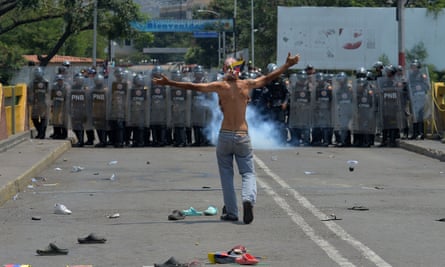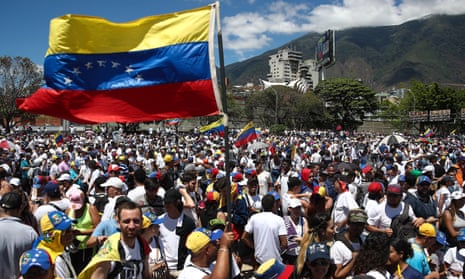Venezuelan opposition leader Juan Guaidó is set to meet US Vice-President Mike Pence on Monday, after asking other countries to consider “all options” to remove President Nicolás Maduro from power.
Guaidó’s comments came after a day of violence, as opposition supporters spent hours trying to break a government blockade and carry food and medical supplies into Venezuela. At least four people were killed and more than 300 hundred injured.
“The events of today oblige me to take a decision,” Guaidó said on Twitter, “to formally propose to the international community that we should keep all options open to achieve the liberation of our homeland.”
Pence will announce “concrete steps” and “clear actions” at a summit of the regional Lima Group in Bogota on Monday, a senior US official told reporters on Sunday.
“What happened yesterday is not going to deter us from getting humanitarian aid into Venezuela,” the official said.
Another top official previously said the US was prepared to bring in fresh sanctions on Venezuela if attempts to deliver aid were met with violence.
Pence will have a one-on-one meeting in Bogota with Guaidó, who the US has recognised as the interim president of Venezuela.
The 35-year-old, who transformed Venezuelan politics and united a fractured and ineffective opposition when he declared himself the country’s legitimate leader in January, has repeatedly said his focus is on a peaceful transition and new elections.
Guaidó claimed on Monday morning that more than 160 soldiers and policemen had fled to Colombia, refusing to continue to follow Maduro’s orders. “Venezuelans recognize the bravery and patriotic spirit of the more than 160 soldiers and policemen who yesterday were on the side of the Constitution,” he wrote on Twitter. “Many more will follow their example.”
But his comments on Saturday raised concerns he might be considering a military intervention and were soon picked up by US hawks including the Florida senator Marco Rubio.
“The grave crimes committed today by the Maduro regime have opened the door to various potential multilateral actions not on the table just 24 hours ago,” Rubio said in response to Guaidó, also on Twitter.
On Sunday morning, he added: “The willingness of many nations to support stronger multilateral actions to dislodge them has increased dramatically.”
US secretary of state Mike Pompeo was more circumspect, saying “further action will be contemplated” at Monday’s meeting of the regional Lima Group, in the Colombian capital Bogota, but focusing on sanctions, humanitarian aid and actions by Venezuelans themselves.

“The Venezuelan people will ultimately I believe hold accountable those who have done so much harm to the fundamental basic rights of the people of Venezuela,” he told CNN’s State of the Nation.
Donald Trump did not immediately respond to Guaidó, but he said last month “all options were on the table”, and has suggested invading Venezuela both in public and private.
The official who spoke on Sunday about Pence’s visit to Bogota was asked if the US would provide military assistance, if requested by Guaidó.
“Ultimately, it would be a decision for the president to make,” the official said.
There have always been strands of the Venezuelan opposition who have called for military intervention, and as the standoff on Saturday dragged on, some in the crowd trying to push aid across the border called for the use of force instead.
“We need a military intervention,” one opposition supporter shouted as she passed a news crew on the Francisco de Paula Santander bridge, which links Cúcuta in Colombia with the Venezuelan town Ureña, a call that was greeted with cheers from others around her.
David Smolansky, opposition leader in exile and close friend and ally of Guaidó, insisted they were not calling for troops on the ground.
“It is still a peaceful movement,” he said. “Violence yesterday came from armed pro-government gangs and security forces.”
But pressed on whether he would support military intervention in future, he declined to rule it out: “The only option we have is to restore democracy and freedom with internal and external pressure.”
Analysts warn there is a serious risk of sliding into armed conflict, and say many of those pushing for intervention are underestimating the cost and possible impact of sending foreign troops to Venezuela.
“Unfortunately the odds of the crisis escalating into conflict are still very real,” said Geoff Ramsey, assistant director for Venezuela at the Washington Office on Latin America. “I think there are actors on both sides that actually think armed conflict could be desirable.
“The clearest risk is that it would devolve into an internal armed conflict that could last decades. An intervention would be bloody, costly, and would likely rely on some kind of mid- or long-term occupation that would have to counter insurgent groups.”
Discussions about military intervention in Venezuela have focused largely on taking on the armed forces. But there are also hundreds of thousands of people outside the military who are armed and experienced, from pro-government gangs to Colombian guerillas the ELN.
Ramsey estimates that there may be between 500,000 and 2 million members of informal militias, many old and poorly trained, but if even 10% could be mobilised to fight for Maduro, it would be a powerful force. The Farc group that destabilised Colombia for decades only had around 18,000 fighters at its peak.
